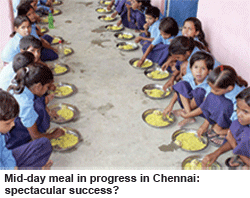The tragic death of 23 children of the Dharmasati Gandaman School, Chhapra, in Saran district, Bihar, after consuming the pesticide-contaminated school mid-day meal on July 16 and numerous scary stories of this type, suggest the rot in India’s school mid-day meal scheme — the world’s largest, covering 120 million children — is systemic. Two days later, 147 girl students of the Neyveli Lignite Corporation Girls Higher Secondary School in Tamil Nadu, were hospitalised after consuming their noon meal. Ditto 20 students in St. Joseph’s High School, Usgao (Goa) on July 19; and 30 primary students in Chhattisgarh on July 20.
Even in the southern state of Tamil Nadu (pop. 72 million) which pioneered the school mid-day meal programme (MDMP) in 1960 and prides itself on its education system, the MDMP is beset with problems of poor management and negligence. Introduced in 1960 by the state’s legendary chief minister K. Kamaraj and expanded to reach all government school children in classes I-X by actor-turned-chief minister M.G. Ramachandran (1917-1987), Tamil Nadu’s mid-day meal programme has proved spectacularly successful in increasing school enrolment and retention, prompting the Supreme Court to recommend it to all 28 state governments and seven Union territories in a landmark directive (November 28, 2001).
 Today, the Tamil Nadu Puratchi Thalaivar MGR Nutritious Meal Programme covers over 10 million children in 92,000 schools statewide at a modest cost of Rs.1,500 crore per year. Consequently, the fall from grace of Tamil Nadu’s exemplary mid-day meal scheme to one in which lunch has to be forced down children’s throats with threats and reprimands, has prompted considerable dismay and head-shaking within the academic community.
Today, the Tamil Nadu Puratchi Thalaivar MGR Nutritious Meal Programme covers over 10 million children in 92,000 schools statewide at a modest cost of Rs.1,500 crore per year. Consequently, the fall from grace of Tamil Nadu’s exemplary mid-day meal scheme to one in which lunch has to be forced down children’s throats with threats and reprimands, has prompted considerable dismay and head-shaking within the academic community.
According to educationists and child rights activists, the main causes of the decline of Tamil Nadu’s mid-day meal scheme are lack of proper storage facilities in most schools, manpower shortage and absence of efficient monitoring. “The mid-day meal programme which feeds so many children requires an effective monitoring system and commitment from officials who should inspect noon meal centres every month. However, most officials shirk this responsibility. Moreover, there is no audit of the mid-day meal scheme by parents, school management committees and local government organisations. Too many rural schools lack storage facilities, potable drinking water, as also clean rooms for cooking. Negligent cooks and meal providers are also responsible for mid-day meal calamities,” says K. Shanmugavelayudham, convenor, Tamil Nadu Child Rights Obser-vatory and Right to Food Campaign.
Despite tall claims made by the Jayalalithaa-led AIADMK govern-ment that the state government has installed separate kitchens in more than 92 percent of government and govern-ment-aided schools, and has equipped them with cooking gas and stoves, in a large number of schools in the Villipuram, Thirunelveli, and Kanchi-puram districts, the mid-day meal is still prepared and served in classrooms.
According to a report in the New Indian Express (July 22), 2,918 government schools statewide and 231 in the Vellore district don’t have separate kitchens. Moreover, according to the third review mission of the mid-day meal scheme undertaken by the Union government in November 2011, there is a massive shortage of meal organisers, cooks and helpers in schools and anganwadis across the state.
With teachers over-burdened with crowded classrooms if not multi-grade teaching, and development officers, storage facilities and cooks in short supply, even as the responsibility of delivering a safe and nutritious mid-day meal is devolving upon over-stretched teachers, rumblings of discontent are getting louder. This could add to the problems of government schools, widely perceived as dysfunctional and inferior to private primary-secondaries. In this connection, news reports that 300,000 government primary teachers in Bihar called a four-day strike (July 25-28) protesting the imposition of mid-day meal responsibilities upon them, has received wide currency in Tamil Nadu. It’s an ominous portent.
Hemalatha Raghupathi (Chennai)



























